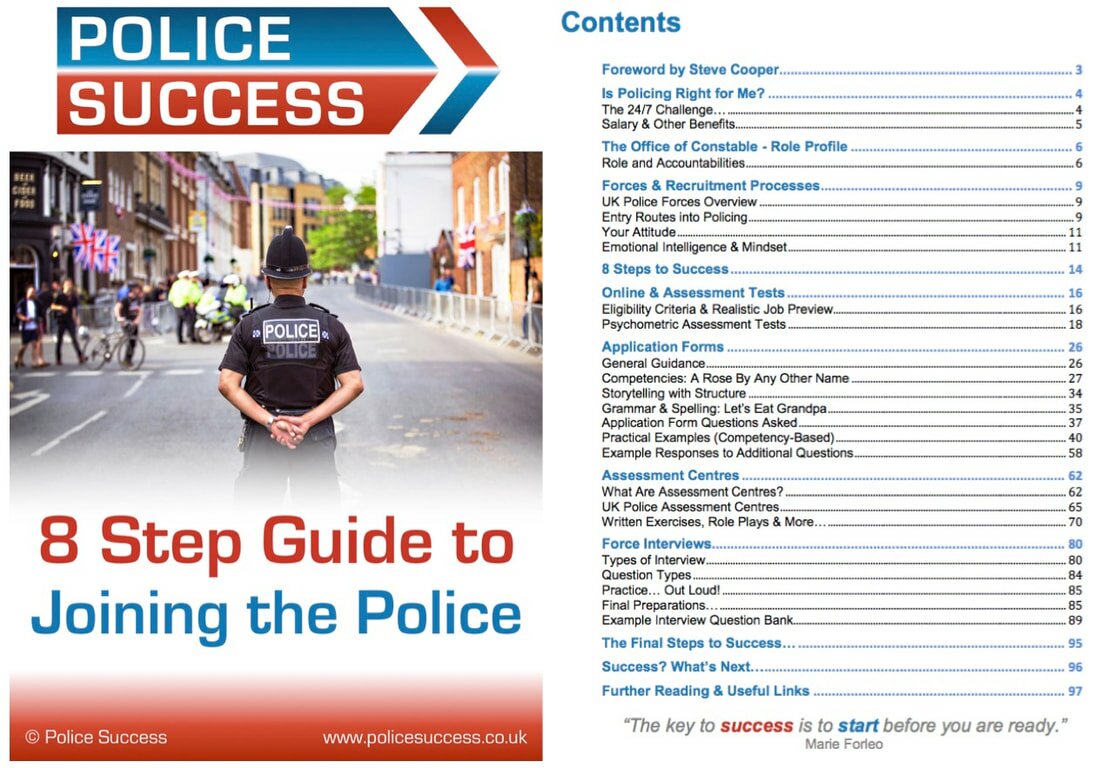What Experience do you Need to Join the Police?
“Experience is often the most valuable thing you have to offer."
- Randy Bausch
The ongoing police recruitment drive aims to boost UK police numbers by 20,000 officers. To achieve this means recruiting an estimated 45,000 police recruits over the next few years accounting for natural turnover. So if policing is a career that appeals to you or someone you know, there has probably never been a better time to apply and a greater chance of being accepted.
In the UK police recruitment process, you will be required to provide details about your life and work experiences in support of your application.
People from a wide variety of backgrounds, ages and life experiences join the police service. The Police Success guide includes many examples from retail, military, professional drivers, technology, and other sectors to help you on your way.
There is a robust selection process, so it is natural to have questions including:
Every police force has a recruitment selection process. Whilst these are standardised nationally to a great extent, there are some differences. The application form is an important element all forces use. A high proportion of applications fall at this early hurdle and simply fail to meet the required standard. Understandably, written application forms can seem to be an onerous exercise, especially if you haven’t done one recently or before. You may have even ruled out applying to join the police, maybe in the belief you don’t have what it takes to be considered, or you don’t know where to start.
“Never underestimate the problem or your ability to deal with it."
- H. Schuller
If that is the case, you could well be mistaken, maybe even missing out on the career opportunity of a lifetime. If you were not aware, many forces also offer support to potential candidates via recruitment information evenings and career insight events, including Q&A sessions.
When it comes to experience, police forces consider every application and each individual on a case by case basis. The current COVID-19 situation may well lead to innovations in police recruitment processes, but opportunity is certainly knocking loudly at the moment for those aiming to make a career in policing. The good news is that you likely already have experience aligned to competencies expected for the role of police officers. These may include working with others, making decisions, demonstrating professionalism and delivering a service to others. That encapsulates a broad spectrum of people across communities and the wider UK workforce! Your force will provide you with bespoke guidance on what is required. It might seem difficult at first to put pen to paper and to start writing down your experiences, but right now is a good time to start… Competencies: A Rose By Any Other Name...
“A rose by any other name would smell as sweet."
- William Shakespeare
Competencies are simply how an organisation communicates how it wants its people to behave and perform within a particular role. It can be confusing when interchangeable language is used to describe competencies in recruitment guidance or instructions. This includes knowledge, skills, attributes, behaviours and/or personal qualities. You may even see all of these in your application guidance and instructions. Here’s a quick practical tip. Use a single name for them, e.g. 'Behaviour'. This can help keep your thinking simple and uncomplicated. Here’s why:
That said, the only way assessors will ever know anything about your behaviour is if you tell them about it. So, it is vital that you evidence the specific behaviours (e.g. Working with Others, Professionalism, Service Delivery, and Decision Making) assessed against the role of police constable. The more you adhere to guidance provided, the easier it will be for assessors to score your application. For example, your force might just use the Competency and Values Framework (CVF). Application Form Example: Decision Making
“Of course, motivating yourself has little to do with energy and everything to do with decisions. Choosing to do something might be hard. You need to decide whether the task is worth the effort."
- Gina Barreca
Applications are the main area of failure for police recruitment, so it can be very helpful to see what successful examples look like, to help when putting together your own evidence towards those important first steps in the process.
The ability to make sound decisions is a highly desired skill in policing. So valuable, it is assessed in police recruitment and also every police promotion process from the rank of Sergeant through to Chief Constable. To support your aspiration and give you an idea of what the ‘8 Step Guide to Joining the Police’ includes to help you get ahead, the following is a full detailed example of the behaviour ‘Decision Making’. Allow yourself some thinking time. The practical example provided below should help to spark your ideas concerning your own experience. It will also give you an idea of how to structure your examples. You’ll notice the broad question comes first, then forces often follow up with some additional questions to help guide you in providing structure and a fuller response…
Please describe a specific occasion when you have considered a number of options before making a decision…
Why was it necessary to consider a number of options before making the decision? I was advised that my employer was to move away from consumer electronics and focus more on the mobile phone side of business. This meant either leaving or changing roles within the branch. I was given the option of several posts all with different factors to consider. Contracted hours offered varied and other roles were much less customer focused. I took time to review all the options considering the potential impact of each on my family and my income. What did you consider when identifying the options? I carefully considered the implications my choice would have on my wider family (I currently live with my parents), the salary change (I’m saving a deposit for a home) balanced against overall job satisfaction. My choices seemed quite stark; redundancy was suggested. However, it became clear that there would be a position for me within the organisation. I had three clear options. The mobile phone section, bakery manager or delivery driver. I spoke with colleagues working in each of these roles to better understand what they involved. What did you consider when making the decision? I considered working hours, shift patterns, the challenges of each role being offered and the salary implications. My preferred choice initially was the phone shop, continuing in a customer facing role. The issue with this was a reduction in working hours to sixteen a week. The bakery manager role offered similar hours and salary to my previous position but required 3am starts, six days a week. I therefore decided upon the driving roleas it offered similar salary, hours, working patterns and included customer contacts. What was particularly good or effective about how you identified the options and made the decision? The requirement to change role came unexpectedly due to retail restructuring. It required careful consideration of the longer-term implications of my decision. After reviewing the options, I believe I made the right choice in the circumstances. I was given time to make my decision and I was able to consider family impact and commitments beyond work. The time enabled me to make a fully informed decision. I have reflected on my choice and the process. I was asked for advice by my team, whilst I was confident in my decision, I advised my colleagues to do as I had done and to consider the wider implications for themselves for roles offered to them. What difficulties did you experience and how did you overcome them? I would not have chosen to apply for any of the roles had I been allowed to continue in a technical specialist role. It was a difficult time, but it was important to realise I was being offered alternative employment as some staff were made redundant and not offered alternatives. None of the three roles I was offered were ideal, but I overcame the dilemma by thinking through advantages and disadvantages before accepting. The process enabled me to settle for the closest match and make an informed choice.
Why not use the red questions now to start drafting your own example of decision making? I hope you found this blog helpful and if you are thinking of applying to join the police service, good luck and I wish you all the very best.
Further Police Application Support
If you would like to see a variety of full detailed examples aligned to police recruitment competencies (behaviours) you can get your copy of our digital ‘8 Step Guide to Joining the Police’ at any time to hit the ground running with your preparation.
Whether you are a member of the public, leaving the military, a serving Special Constable or PCSO looking to join as a full-time police officer, get your copy of our toolkit now for a range of application examples, plus a raft other detailed guidance on joining the police service.
Kind Regards,
Steve
0 Comments
Your comment will be posted after it is approved.
Leave a Reply. |
 RSS Feed RSS Feed
AuthorA former Royal Marine, Detective Inspector, and is a qualified coach/mentor. With extensive police experience, Steve also established Rank Success to help officers achieve police promotion. CategoriesAll ArchivesFebruary 2021 |







